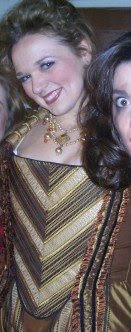
Almost two weeks ago, I returned from a recent engagement at Baltimore's Opera Vivente a completely different performer. I learned many things from this particular gig, but two in particular really stuck in my mind. It was my first Donna Elvira, a role I had been equally relishing and dreading, for many varied reasons. Like Amanda, I had always primarily thought of her as an angry, scorned woman, no matter how in depth I had researched her character. I knew she had an "every woman" quality about her, but it always seemed difficult to find until I actually brought her to life.
It wasn't until the first staging rehearsal of "Mi tradi" that I had that epiphany. And I do mean, "that epiphany," because I actually remember saying exactly that to the director at the time. I had been doing the aria for a few years as an audition piece and had always started it out strong and angry, with a huge sense of scorned betrayal. During this rehearsal, it was suggested that I start it out a little quieter and let it build, not only through the recitative, but through the aria as well. (for the life of me, I can't remember who exactly suggested it, but it worked, so thank you). How did it make me feel to really, truly start it with the knowledge that Don Ottavio wanted to kill Giovanni? Just by using that feeling, I was able to build through the recit, start quiet again through the beginning of the aria section and make every repeat of the theme sound different. It was as if I was singing a completely different piece! I was floored, to say the least. And, Donna Elvira felt more real to me than she had ever felt before. Needless to say, from then on, it informed my character in every scene. Throughout our run of four performances, I hope and trust that I was able to bring her to life as much as I think she should have been.
My second "epiphany" of sorts, which Amanda and I both talked about a few days ago over coffee was this: I knew that I came back a different singer and was pretty sure I knew why it was, but it wasn't until she and I discussed our mutual role experiences that I really understood the full extent of what I had learned. By the third show, I hit a place somewhere between calm relaxation before I went on and the adrenaline rush. I was initially afraid that I wasn't pumped enough to bring the stamina needed or the character needed. Once I got on stage, however, I felt myself thinking like her, but also thinking like myself (in a relaxed state) so that I was consciously able to momentarily stop for a technical check-in when it was necessary. It was that fine line between being too character-engrossed that you lose the vocal technique and too vocally engrossed that you become "the posing opera singer." Honestly, the biggest place it helped was when I knew I needed to take an extra big breath to get through a long phrase (of which Elvira has MANY). Overall, I'd say it made me realize how much I was learning from this incredible role.
Both of these particularly poignant realizations came, I believe, from allowing myself to be open to different ideas and flexible enough to work with what I was given (which was actually quite a lot: an open-minded director, a supportive cast and a small, yet professionally run company). I am still amazed and elated that I have come back to New York and the stress of life here to realize that the act of paying a little more attention to my general awareness, my character research, and my relaxation is informing my singing more than ever, making it easier and easier to go into auditions as a confident, well-informed performer.









